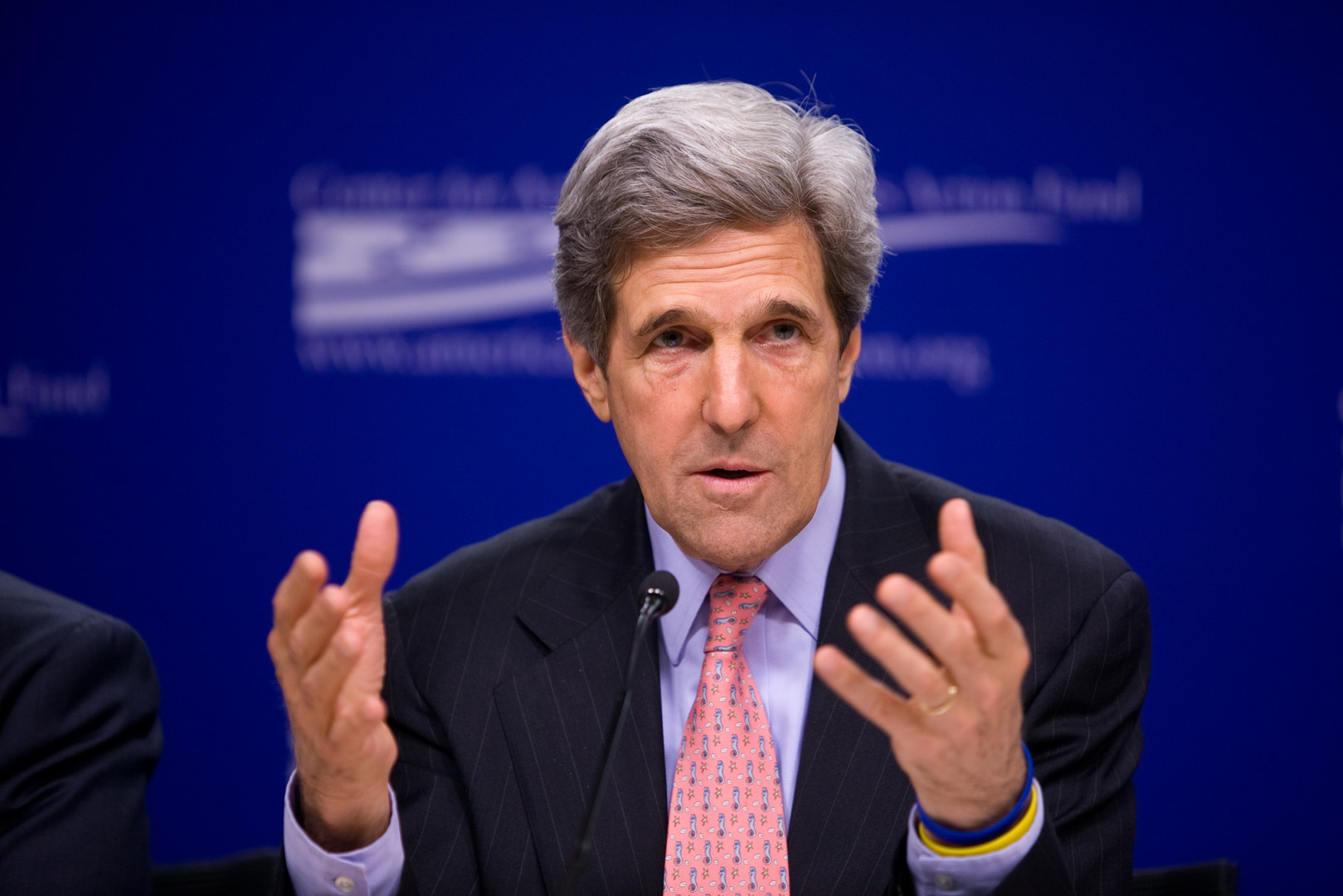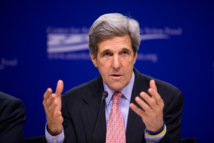From October 30 to November 3, John Kerry will visit Kyrgyzstan, Uzbekistan, Kazakhstan, Tajikistan and Turkmenistan. Thus, he will become the first US secretary of state, who will visit all five countries of the region in the course of a single trip. Mr. Kerry is going to focus on issues of regional and global security, fight against terrorism, as well as the United States’ bilateral relations with the region’s countries, including in the humanitarian sphere. In addition to bilateral meetings, John Kerry will hold a meeting in Samarkand in a new format C5+1 (with the participation of all the region’s foreign ministers at the same time). Last time, when the US secretary of state - it was Hillary Clinton - visited the region, was in 2010.
Interests of many players are concentrated in Central Asia today. October 27 ended the prime minister of Japan Shinzo Abe’s visit to Central Asia. In June, the region attracted attention of the UN Secretary General Ban Ki-moon; in July - Prime Minister of India Narendra Modi.
Russia hopes to expand to the south of the Eurasian Economic Union (EEU), so far joined only by Kazakhstan and Kyrgyzstan. China agreed with the five countries of the region for their active participation in the project "Silk Road Economic Belt" (SREB). Biggest part of China’s participation here lies in Chinese investments (mainly in infrastructure projects) and trade flows. At origin, there was a competition between the two economic projects; later it transformed into cooperation. President Xi Jinping signed an agreement on pairing EEU and SREB during his visit to Moscow in May 2015.
In 2011, the White House announced on its own "Silk Road" initiative, which had almost the same goals as the Chinese’s, which appeared three years later. Its essence, according to Deputy Secretary of State Anthony Blinken, is to "help the region integrate into the world economy" through development of infrastructure. As part of the CASA-1000, project was supposed to transfer excess energy from hydroelectric power plants from Kyrgyzstan and Tajikistan to Afghanistan. Nevertheless, four years later, the initiative has brought no visible results. Now the name is already closely associated with the Chinese project. Washington, however, has not completely abandoned its plans.
Yet, a key consideration during John Kerry’s tour is expected to be paid to security issues. The Central Asian states are in an extremely vulnerable position in the face of growing threats from the south due to the deteriorating situation in Afghanistan. “Islamic State” has already been noticed there on a par with Taliban and extremist groups, traditionally present there, including the "Islamic Movement of Uzbekistan", "Islamic Movement of Turkestan" and "Al- Qaeda ". NATO troops’ pullout from Afghanistan contributed to the already tense situation in the region.
Kazakhstan, Kyrgyzstan and Tajikistan, members of the Collective Security Treaty Organization (CSTO), in the case of an acute crisis can count on assistance from Moscow, which already provides Bishkek and Tashkent with multibillion-dollar military assistance. Uzbekistan, suspended its membership in the CSTO, and declared itself neutral Turkmenistan have proved to be in less protected position.
This year, the United States has provided Uzbekistan (free of charge) hundreds of used armored vehicles (armored personnel carriers, 308 mine-protected and 20 Armoured Recovery Vehicle) for the first time. Turkmen authorities asked the United States’ assistance "for the protection of borders and neutralize threats".
The United States’ visit will also focus on humanitarian cooperation with the countries of the region. For example, in Bishkek, John Kerry will attend opening of a new campus of the American University of Central Asia. The ceremony will be attended by billionaire George Soros, whose fund has entered into the informal "black list of undesirable organizations", compiled by the Russian parliamentarians.
Several international human rights organizations called on John Kerry to raise the issue of human rights and media freedom during his visit. The latest US State Department report on human rights accuses all the five countries’ authorities of "systematic violation of fundamental rights and freedoms", and even torture in all cases, except for Kazakhstan. International organizations appealed with a request to draw attention to these problems to the Prime Minister of Japan Shinzo Abe, visited the region a week earlier. However, he ignored these calls.
Interests of many players are concentrated in Central Asia today. October 27 ended the prime minister of Japan Shinzo Abe’s visit to Central Asia. In June, the region attracted attention of the UN Secretary General Ban Ki-moon; in July - Prime Minister of India Narendra Modi.
Russia hopes to expand to the south of the Eurasian Economic Union (EEU), so far joined only by Kazakhstan and Kyrgyzstan. China agreed with the five countries of the region for their active participation in the project "Silk Road Economic Belt" (SREB). Biggest part of China’s participation here lies in Chinese investments (mainly in infrastructure projects) and trade flows. At origin, there was a competition between the two economic projects; later it transformed into cooperation. President Xi Jinping signed an agreement on pairing EEU and SREB during his visit to Moscow in May 2015.
In 2011, the White House announced on its own "Silk Road" initiative, which had almost the same goals as the Chinese’s, which appeared three years later. Its essence, according to Deputy Secretary of State Anthony Blinken, is to "help the region integrate into the world economy" through development of infrastructure. As part of the CASA-1000, project was supposed to transfer excess energy from hydroelectric power plants from Kyrgyzstan and Tajikistan to Afghanistan. Nevertheless, four years later, the initiative has brought no visible results. Now the name is already closely associated with the Chinese project. Washington, however, has not completely abandoned its plans.
Yet, a key consideration during John Kerry’s tour is expected to be paid to security issues. The Central Asian states are in an extremely vulnerable position in the face of growing threats from the south due to the deteriorating situation in Afghanistan. “Islamic State” has already been noticed there on a par with Taliban and extremist groups, traditionally present there, including the "Islamic Movement of Uzbekistan", "Islamic Movement of Turkestan" and "Al- Qaeda ". NATO troops’ pullout from Afghanistan contributed to the already tense situation in the region.
Kazakhstan, Kyrgyzstan and Tajikistan, members of the Collective Security Treaty Organization (CSTO), in the case of an acute crisis can count on assistance from Moscow, which already provides Bishkek and Tashkent with multibillion-dollar military assistance. Uzbekistan, suspended its membership in the CSTO, and declared itself neutral Turkmenistan have proved to be in less protected position.
This year, the United States has provided Uzbekistan (free of charge) hundreds of used armored vehicles (armored personnel carriers, 308 mine-protected and 20 Armoured Recovery Vehicle) for the first time. Turkmen authorities asked the United States’ assistance "for the protection of borders and neutralize threats".
The United States’ visit will also focus on humanitarian cooperation with the countries of the region. For example, in Bishkek, John Kerry will attend opening of a new campus of the American University of Central Asia. The ceremony will be attended by billionaire George Soros, whose fund has entered into the informal "black list of undesirable organizations", compiled by the Russian parliamentarians.
Several international human rights organizations called on John Kerry to raise the issue of human rights and media freedom during his visit. The latest US State Department report on human rights accuses all the five countries’ authorities of "systematic violation of fundamental rights and freedoms", and even torture in all cases, except for Kazakhstan. International organizations appealed with a request to draw attention to these problems to the Prime Minister of Japan Shinzo Abe, visited the region a week earlier. However, he ignored these calls.



















